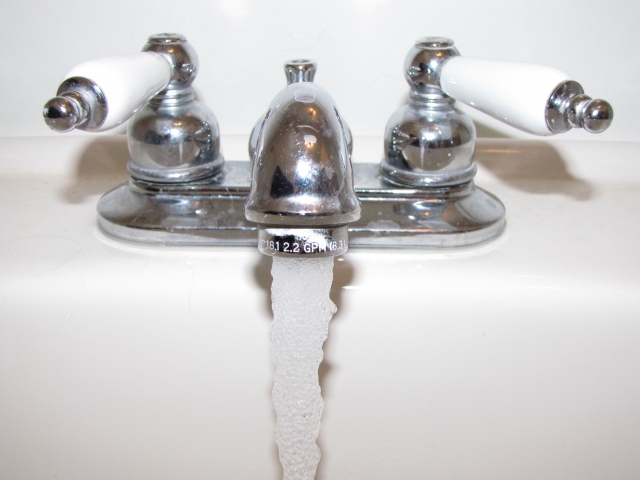Utility-tarian Economics: Could conservation bankrupt the water service?
Early adopters of water meters are about to lose a significant advantage gained in 2010.
Households that both installed the technology and managed to keep monthly usage below 30 cubic metres (30,000 litres), paid only 20 cents/m³ last year; that rate will jump to 52 cents/m³ this year, should the annual water rates bylaw pass at council on Monday.
Combined with a flat annual rate of $201, the metered user of 29.8 cubic meters of water each month will pay the same $387 annually for water in 2011 as a non-metered user. That’s an eight per cent increase for non-metered users and a 160 per cent rate increase for metered users in that – the lowest – usage range.
“We’ve had lots of discussion about building an incentive for people to put these meters in their homes,” said councillor Hanne Smith at Monday night’s Committee of the Whole meeting, when councillors meet outside of the more formal council meeting structure to hash out complicated (often financial) issues. “To me, [this] option doesn’t look like much of an incentive.”
Metered users of less than 29.8 monthly m³ can still save, but here’s hoping they all won’t. Water service – especially in a small municipality – is a tricky policy area, located at the nexus of environmental values and a number of problematic practical considerations.
“If everbody wants to [engage in] conservation, this is what will happen: the utility will be broke,” said administrator Victor Kumar, who provided councillors a detailed explaination of the 2011 staff recommendation in the report, along with an assessment of potential ways forward in 2012.
“The disparity in the rate structure of metered and non-metered ratepayers is substantial to the point that the water utility could incur a deficit. The basic cost of water is 69 cents/m³.”
The trouble with water is that it costs plenty to deliver. In the past, staff have assessed that as much as 97 per cent of the provision cost is fixed, primarily in infrastructure needs, and that the remaining variable costs, primarily labour in maintenence and inspections, are both negligible and challenging to cut.
The operating water account balance has not been a problem to date. As councillor Laurie Charlton pointed out, that account ran a six-figure surplus in 2008, 2009 and even 2010 – despite a projected deficit of approximately $24,700 in the latter year. But that surplus was then transferred to the capital account, where the numbers are not as good. Last year, the city ran a capital water surplus of approximately $12,800. And there is plenty to be done.
Monday night’s report includes a laundry list of water system projects potentially slated for 2011, at a total of $1.18 million, including a portion of the water system improvements likely for Columbia Avenue and Washington streets, though not all are yet approved by council, and it’s by no means settled exactly from where the funds for each project will come. Grant applications are still pending and DCCs will fund a $250,000 upgrade to the Ophir Creek reservoir, for example.
And water service revenues going forward are in a state of considerable uncertainty. Only a small proportion of residents have installed the water meters, despite a city decree (and assistance program) that mandates meters in place by the end of 2011.
Though the data is limited, Kumar’s concern is that if every ratepayer drastically cuts water consumption to between 10-15 m³/monthly once meters are installed, at current rates the service will be unable to meet costs. A small poll conducted by public works manager Darren Albo for 2010 found average monthly consumption figures for 2010 ranging from 6.7 m³ for a single person to 23 m³ for a family of five.
But those metered accounts are early adopters and so not a representative sample, argued Charlton, concluding that early concerns about deficits are overstated.
A suggestion by councillor Kathy Moore that non-metered users be penalized this year with an additional charge, refundable upon the meeting of the end of year meter install deadline, was not taken up by the group amidst concerns of fairness, since the Dec 31 deadline date was set in 2008, and some Rossland homeowners are facing costly installation issues.
By 2012, the city will have better tracking software and more meters in place, making next year’s water account assessment and rate-setting, hopefully, a far easier task for a new city council.
Long term thinking about water and its real costs is the important piece, said councillor Kathy Wallace.
“We need to make conservation a part of our lives, so that in the long run we’re not going to look at huge upgrades to the system. Just give water its true value.”
The 2011 rates are not set until council approves the bylaw. Water bills for 2011 will be mailed in April.

























